|
|
|
Sort Order |
|
|
|
Items / Page
|
|
|
|
|
|
|
| Srl | Item |
| 1 |
ID:
096499
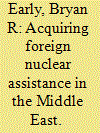

|
|
|
|
|
| Publication |
2010.
|
| Summary/Abstract |
The United Arab Emirates (UAE) has laid out an ambitious plan to become the first Arab country to possess a civilian nuclear energy program. Central to that effort has been the Emirati government's ability to obtain foreign nuclear assistance. This article traces the UAE's strategies for overcoming the obstacles that stood in the way of nuclear suppliers providing assistance. It examines the approach taken by the UAE to assuage the safety and security concerns of nuclear suppliers, how the UAE leveraged its alliances with France and the United States to obtain their cooperation, and its strategies for engaging domestic interest groups in supplier states. The generalizable elements of the UAE's strategies are discussed and used to provide insight into the prospects for other Middle Eastern states' bids to obtain similar assistance. The article concludes with a discussion of the potentially transformative aspects of the strategies employed by the UAE in shaping other countries' pursuit of nuclear energy in the region.
|
|
|
|
|
|
|
|
|
|
|
|
|
|
|
|
| 2 |
ID:
113758
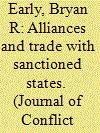

|
|
|
|
|
| Publication |
2012.
|
| Summary/Abstract |
What determines how US economic sanctions affect the international trade conducted with their targets? This article develops a liberal-based explanation for why economic sanctions increase their targets' trade with some third parties and decrease it with others. It is theorized that the effects of defense pact alliances between sender and third-party states are conditional upon the strength of the third parties' commercial dependence upon the target states. Third parties will cooperate with senders when the costs are low, but use their alliance relationships as cover to sanctions bust when the commercial benefits are high. This suggests that the United States can best gain the support of allies whose cooperation matters the least, while the allies whose support is most important tend to sanctions bust. It is also theorized that a target state's allies trade more with it than its nonallies. An empirical analysis of ninety-six episodes of US-imposed sanctions supports these hypotheses.
|
|
|
|
|
|
|
|
|
|
|
|
|
|
|
|
| 3 |
ID:
106357


|
|
|
|
|
| Publication |
2011.
|
| Summary/Abstract |
The adoption of UN Security Council Resolution (UNSCR) 1540 in 2004 reflects an emerging consensus that more should be done by the international community to address the proliferation of weapons of mass destruction. UNSCR 1540 articulates a universal, legally binding obligation for all states to confront proliferation by adopting effective export control systems. To date, however, there have been no attempts to systematically analyze compliance with this new obligation, making it impossible to assess the success of this measure and the underlying causes of any shortcomings. This study addresses this by conducting a systematic empirical analysis of state compliance with UNSCR 1540. Drawing upon theories of compliance with international law, we investigate two distinct explanations for variation in the degree to which states adopt nonproliferation export controls: one based on state interests and enforcement and the other based on state capacity. Our statistical tests of these theories use a new, cross-national data set detailing the nonproliferation policies of 30 states. The empirical results indicate that compliance with international nonproliferation obligations is influenced most by a state's economic and governmental capacities and has little to do with interest-based factors. These findings suggest that capacity-building programs are the best option for improving the implementation of UNSCR 1540 and of nonproliferation efforts in general.
|
|
|
|
|
|
|
|
|
|
|
|
|
|
|
|
| 4 |
ID:
140283


|
|
|
|
|
| Summary/Abstract |
When international institutions obligate their members to impose economic sanctions against a target state, how much do those sanctions obligations actually impact their members' behavior? To date, the consensus view has treated all international institutions as if they are equally capable of making multilateral sanctioning efforts more effective. Building upon the enforcement theory of sanctions cooperation, we instead theorize that the ability of international institutions to constrain their members from engaging in spoiler behaviors degrades the larger they are. We hypothesize that sanctions obligations imposed by smaller-sized institutions are more effective at preventing their members from becoming extensive trade-based sanctions busters than those imposed by larger ones. We test our hypothesis via a quantitative analysis of how the involvement of five different international institutions in sanctioning efforts influenced their members' likelihoods of sanctions-busting. We find that only the smaller-sized institutions we examine appear capable of constraining their members from undercutting sanctioning efforts. Notably, we find no evidence that the United Nations' sanctions actually prevent its members from sanctions-busting.
|
|
|
|
|
|
|
|
|
|
|
|
|
|
|
|
| 5 |
ID:
172091
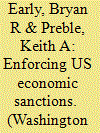

|
|
|
| 6 |
ID:
130998
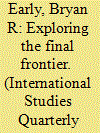

|
|
|
|
|
| Publication |
2014.
|
| Summary/Abstract |
While space capabilities were once concentrated among a handful of leading powers, an increasingly large number of states have gained access to them. As of 2007, 58 countries possessed dedicated civil space programs, 44 countries had placed nationally owned satellites into orbit, and 9 countries had achieved domestic space launch capabilities. To date, however, no systematic inquiries have ever been conducted into which countries acquire space capabilities and why. Within this paper, I develop an explanatory account that explores the capacity-based factors and political motivations that influence countries' acquisition of space capabilities. I test my hypotheses via a quantitative analysis of the factors affecting 143 countries' acquisition of civil space programs, satellite capabilities, and space launch capabilities from 1950 to 2002. My findings shed new light on the primary causes of the proliferation of civil space capabilities and yield a number of important policy implications
|
|
|
|
|
|
|
|
|
|
|
|
|
|
|
|
| 7 |
ID:
081309
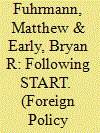

|
|
|
|
|
| Publication |
2008.
|
| Summary/Abstract |
In September 1991, U.S. President George H.W. Bush launched the Presidential Nuclear Initiatives (PNIs), which were unilateral measures that led to the largest reductions in the American and Soviet/Russian nuclear arsenals to date. Despite their eventual success, the United States took on significant risks in launching the PNIs. To uncover the best theoretical explanation for their onset, this article uses realism, neorealism, the bureaucratic politics model, expected utility theory, and prospect theory to generate ex ante predictions regarding nuclear arms control at the end of the Cold War. It then tests the theories' predictions against the empirical record. The results suggest that a focus on an individual decision maker-President Bush-is necessary to fully understand the PNIs and that an explanation rooted in prospect theory offers the most explanatory power. This study speaks to an important debate in discipline regarding the significance of individuals, while underscoring the value of exploring foreign policy decision making from multiple levels of analysis. It also advances the literatures on risk acceptance and prospect theory by shifting their applications away from militarized conflict and crises to diplomatic negotiations and cooperation
|
|
|
|
|
|
|
|
|
|
|
|
|
|
|
|
| 8 |
ID:
171984


|
|
|
|
|
| Summary/Abstract |
How economic sanctions are enforced undoubtedly affects their chances of success. Yet, to date, a lot remains unknown about how governments actually enforce their sanctions. To shed light on the ways governments enforce their sanctions, we conduct an empirically driven case study of how the lead agency for enforcing economic sanctions in the United States, the Treasury Department’s Office of Foreign Assets Control (OFAC), has enforced US sanctions from 2003 to 2018. Our study begins with an empirical exploration of how OFAC’s enforcement actions originate, what factors correlate with enforcement actions being taken, and what factors contribute to the financial penalties imposed as part of enforcement actions. We find that OFAC engaged in two distinct enforcement strategies during our period of analysis: a “fishing” strategy that involved taking a lot of enforcement actions and imposing small fines during the administration of George W. Bush and a “whale-hunting” strategy that involved pursuing fewer cases but imposing enormous fines during Barack Obama’s administration. Our analysis indicates that the shift in foreign policy emphasis from Cuba to Iran during the Bush administration and how that motivated new legislation to enhance penalties for violating sanctions paved the way for the OFAC to adopt its innovative whale-hunting strategy during the Obama administration. Our study also yields a wealth of new empirical insights into how the United States enforces its sanctions that can contribute to future theory-building efforts.
|
|
|
|
|
|
|
|
|
|
|
|
|
|
|
|
| 9 |
ID:
134649


|
|
|
|
|
| Summary/Abstract |
Nuclear weapons are uniquely capable of threatening entire countries’ existences, but not all nuclear weapons possessors are equally capable of posing such threats. This article explores the existential threats that nuclear weapons possessors pose with a new, empirically based metric called the Nuclear Annihilation Threat (NAT) Index. Using the NAT Index, we comparatively analyze the existential threats and vulnerabilities that nuclear-armed states face from one another. In particular, we apply these insights to gain a better understanding of the nuclear security threats and vulnerabilities of the United States and Israel and explore the implications of Iran going nuclear for both countries.
|
|
|
|
|
|
|
|
|
|
|
|
|
|
|
|
| 10 |
ID:
162681


|
|
|
|
|
| Summary/Abstract |
Recent scholarship has largely ignored systematic differences in the existential threats that nuclear-weapon possessors pose to other states. This study theorizes that the capacity to pose existential threats shapes nuclear-armed states’ willingness to use military force against one another. We explore three hypotheses regarding how nuclear-based existential threats can deter conflict or encourage it, including under the conditions proposed by the stability–instability paradox. We rely on a statistical analysis of nuclear-armed dyads from 1950 to 2001 and employ the Nuclear Annihilation Threat (NAT) Index to capture variation in the existential threats nuclear-armed states pose to one another. We find that being able to pose an existential threat to another state emboldens potential initiators to use military force but does not deter attacks. The emboldening effects are particularly strong under the hypothesized conditions of the stability–instability paradox. Our study provides unique contributions to ongoing debates over the political effects of nuclear weapons.
|
|
|
|
|
|
|
|
|
|
|
|
|
|
|
|
| 11 |
ID:
087572


|
|
|
|
|
| Publication |
2009.
|
| Summary/Abstract |
Research indicates that if third parties provide assistance to sanctioned states, the sanctions are less likely to be successful. However, the scholarship on the profile of sanctions busters and their motivations remains underdeveloped. Drawing on the realist and liberal paradigms, this piece develops two competing theories to account for third-party sanctions-busting. The hypotheses drawn from these theories build upon existing work on sanctions, the political determinants of international trade, and the effects of indirect interstate relationships. A quantitative analysis develops a new measure to identify sanctions-busting behavior for a dataset covering 77 sanctions cases from 1950 to 1990. The liberal and realist explanations are then tested. The results offer strong support for the liberal theory of sanctions-busting and less support for the realist theory. In particular, the analysis reveals a counter-intuitive finding that a sender's close allies are more likely to sanctions-bust on the target's behalf than are other states.
|
|
|
|
|
|
|
|
|
|
|
|
|
|
|
|
| 12 |
ID:
181164
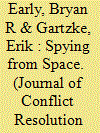

|
|
|
|
|
| Summary/Abstract |
Despite considerable interest and debate, it has proven surprisingly difficult to demonstrate a systematic link between technological change and patterns of war and peace. At least part of the challenge may reside in finding the right place to “look” for such relationships. Technological change alters what nations can do to one another (capabilities), but in ways that are typically reflected by deals (diplomatic bargains) rather than actions. We theorize that reconnaissance satellites have revolutionized the use of information gleaned from spying in ways that discourage states from engaging in serious conflicts with one another. We analyze the impact of reconnaissance satellites on high-casualty militarized interstate disputes (MIDS) between dyads from 1950 to 2010. We find that when either the potential aggressor or target in a dyad possess reconnaissance satellites, they are significantly less likely to become involved in serious MIDs. This effect is especially powerful when both states possess reconnaissance satellites.
|
|
|
|
|
|
|
|
|
|
|
|
|
|
|
|
| 13 |
ID:
164452


|
|
|
|
|
| Summary/Abstract |
Economic sanctions have faced substantial criticism for being blunt coercive instruments that inflict a broad array of harms upon innocent populations. In response to this, the targeted sanctions movement has sought to limit the form, function, and scope of sanctioning efforts to minimize their adverse effects on average citizens who have no direct role in influencing the objectionable policies sanctions' senders senders want changed. We seek to take stock of whether targeted sanctions are truly more ethical coercive policies. We argue that targeted sanctions strategies, as practiced by the international community, tend to make tradeoffs amongst just war theory principles and at the cost of sanctions’ utility. Rather than representing an ethical form of coercion, targeted sanctions often just differ from more comprehensive sanctions in how they violate just war principles. We demonstrate this by showing that although targeted sanctions are arguably more consistent with the principle of discrimination's prohibition of deliberately targeting civilians, they nevertheless conflict with other norms, such as proportionality and reasonable probability of success. Moreover, targeted sanctions have these adverse effects despite an appearance of precision that may make it easier to employ coercion.
|
|
|
|
|
|
|
|
|
|
|
|
|
|
|
|
| 14 |
ID:
108185
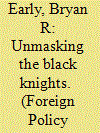

|
|
|
|
|
| Publication |
2011.
|
| Summary/Abstract |
Despite clear expectations that sanctions busters undermine the effectiveness of economic sanctions, most empirical studies of the phenomenon fail to find that they significantly affect sanctions outcomes. One explanation for these puzzling results is that past studies have almost all relied on Hufbauer, Schott, and Elliott's (1990) dichotomous, time-invariant "black knight" variable to operationalize the occurrence of sanctions-busting. This piece develops a more nuanced account of how the timing, quantity, and nature of sanctions-busting trade affects sanctions' outcomes and codes a new set of sanctions-busting variables that capture these distinctions. Two competing accounts of sanctions-busting are tested in the analysis, one that asserts that only politically motivated sanctions busters (i.e., black knights) negatively affect sanctions' success and one that asserts that commercially and politically motivated sanctions busters jointly undermine their success. These rival accounts are tested using a competing risks analysis of 96 episodes of US-imposed sanctions from 1950 to 2006. The results indicate that while black knights alone do not make sanctions more likely to fail, in conjunction with commercially-motivated sanctions busters they do exercise a potent, negative effect on sanctions' success. These findings have important implications for how third party responses affect sanctions outcomes.
|
|
|
|
|
|
|
|
|
|
|
|
|
|
|
|
| 15 |
ID:
167879


|
|
|
|
|
| Summary/Abstract |
We theorize that foreign aid relationships influence both the effectiveness of economic sanctions threats and the aggressiveness of senders in imposing sanctions. Aid sanctions are generally far less costly for senders than imposing commercially oriented sanctions but can still be very costly for their targets. Being able to disrupt aid flows as part of potential sanctions enhances sender states’ credibility that they will impose painful sanctions against resisting target states. The more foreign aid a sender provides to a target state, the more successful we expect its sanctions threats to be and the more aggressive we expect the sender to be in imposing sanctions if the target resists. We test our theory using a competing risks analysis of ongoing, politically motivated sanctions threats issued by the United States from 1960–2010. Our analyses support our theory by revealing that the more foreign aid that the United States provides to target states, the more likely US sanctions threats are to succeed and the more aggressive the United States becomes in imposing sanctions.
|
|
|
|
|
|
|
|
|
|
|
|
|
|
|
|
|
|
|
|
|